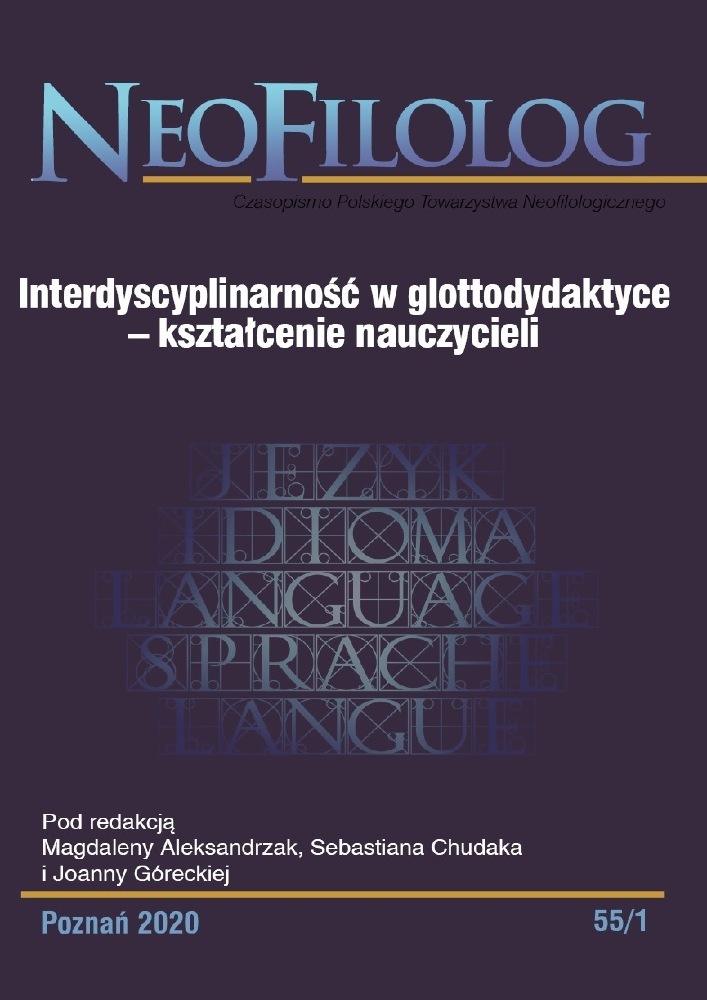Abstrakt
The trend for eco-linguistics, which has been dynamically developing in the English-language literature since the 1970s, proposes a change in the perception of the relationship between language, nature, and culture, in a sense making language a link which brings together nature and culture, rather than separating them as is traditional. This approach poses important questions: How do languages work in the ecosystem created by the language environment of all users of a given language context? What relationships can they enter into? How should one perceive the development of multilingualism in such an ecological approach, in which not only does "strong" affect the "weak" but “weak” reciprocates? "Weak" has an important place in the language ecosystem, which risks serious changes due to excessive weakening of one of its components.
This paper aims to examine the possible inspirations that eco-linguistics offers Foreign Language Teaching (FLT), highlighting the role of each language and sensitizing the reader to the relationships that arise between languages and their users in a given environment. From this perspective Claire Kramsch (2008) postulates a change in the perception of the main function of the teacher from the "teacher of a code" to the "teacher of meaning", which has specific didactic consequences in how language activities are approached. Is the school classroom a place for activities which have their origin in the trend for eco-FLT?
Bibliografia
Bronfenbrenner U. (1979), The ecology of human development: Experiments by nature and design. Cambridge, Massachusetts, London : Harvard University Press.
Calvet L.-J. (1999), Pour une écologie des langues du monde. Paris: Plon.
Chen S. (2016), Language and ecology: A content analysis of ecolinguistics as an emerging research field. „Ampersand”, nr. 3, s. 108-116. Online: https://www.sciencedirect.com/journal/ampersand/vol/3/suppl/C [DW 15.06.2019].
Costa J. (2008), Langues et cultures régionales, langues vivantes étrangères. Quels enjeux pour une convergence didactique ? „Les Cahiers de l'Acedle”, nr 5, s. 109-128.
Czerepaniak-Walczak M. (2006), Pedagogika emancypacyjna, rozwój świadomości krytycznej człowieka. Gdańsk: Gdańskie Wydawnictwo Psychologiczne.
Defays J.M. (2017), Une didactique des langues et cultures écologique, dutable, douce? „Le français dans le monde”, nr 414. Online: http://jeanmarcdefays.be/une-didactique-des-langues-et-des-cultures-ecologique-durable-douce/ [DW 20.08.2019].
Dotov D.G., Nie L., de Wit M.M. (2012), Zrozumieć afordancję: przegląd badań nad główną tezą Jamesa J. Gibsona. „Avant”, nr 3/2, s. 282-295 (przekład: D. Lubiszewski, N. Strehlau).
Giroux H.A., Witkowski L. (red.) (2010), Edukacja i sfera publiczna, idee i doświadczenia pedagogiki radykalnej. Kraków: Oficyna Wydawnicza Impuls.
Gołębniak B.D., Krzychowiak S. (2015), Akademickie kształcenie nauczycieli w Polsce – raport z badań. „Rocznik Pedagogiczny”, nr 38, s. 97-112.
Hagège C. (1985), L`homme de paroles. Paris: Fayard.
Hahn Y., Rodriguez-Kaarto T.J. (2015), Designing for social integration: an ecological approach to language learning. „Nordes” nr 6, s. 1-8. Online: https://archive.nordes.org/index.php/n13/issue/view/11 [DW 15.07. 2019].
Gibson J.J. (1986), The Ecological Approach to Visual Perception. Hillsdale, New Jersey: Lawrence Erlbaum.
Haugen E. (1972), The Ecology of Language. Stanford University Press: Stanford, CA.
Kramsch C., Steffensen S.V. (2008), Ecological perspectives on second language acquisition and socialization, (w:) Duff P.A., Hornberger N.H. (red.), Encyclopedia of Language and Education, 2nd Edition, nr 8, s. 17-28. Online: https://www.researchgate.net/publication/226707454_Ecological_Perspectives_on_Second_Language_Acquisition_and_Socialization [DW: 15.07.2019].
Krawczak M. (2017), Poznańska Szkoła Ekolingwistyki. „Scripta Neophilologica Posnaniensia”. t. XVII, s.145-192.
Online: https://pressto.amu.edu.pl/index.php/snp/article/view/13280/12990 [DW 28.08.2019].
Kucharczyk R. (2018), Nauczanie języków obcych a dydaktyka wielojęzyczności (na przykładzie francuskiego jako drugiego języka obcego). Lublin: Werset.
Lankiewicz H. (2015), Teacher language awareness in the ecological perspective. A collaborative inquiry based on languaging. Gdańsk: Wydawnictwo Uniwersytetu Gdańskiego.
Larsen-Freeman D. (1997), Chaos/complexity science and second language acquisition. „Applied Linguistics”, nr 18 (2), s. 141-165.
Lechevrel N. (2010), L’écologie du langage d’Einar Haugen. „Histoire Épistémologie Langage”, nr 32 (2), s. 151-166. Online: https://www.persee.fr/doc/hel_0750-8069_2010_num_32_2_3192 [DW 20.08.2019].
van Lier L. (2004), The Ecology and Semiotics of Language Learning: A Sociocultural Perspective. Boston: Kluwer Academic.
van Lier L. (2010), The ecology of language learning: Practice to theory, theory to practice. „Procedia Social and Behavioral Sciences”, nr 3, s. 2-6.
Longhi J. (2012), Compte-rendu de : « Les Approches écologiques en linguistique » (N. Lechrevel, 2010) : pour une linguistique « verte » ? „Corela. Cognition, Représentation, Langage”, nr 10 (1), s. 1-5. Online : http://journals.openedition.org/corela/2674 [DW 20.08.2019]
Matczak P. (2000), Problemy ekologiczne jako problemy społeczne. Poznań: Wydawnictwo Naukowe UAM, Seria Socjologia nr 27.
Moore J. (2015), Capitalism in the Web of Life Ecology and the Accumulation of Capital. London/New York: Verso.
Mühlhäusler P. (1996), Linguistic Ecology. Language Change and Linguistic Imperialism in the Pacific Region. Routledge: London.
Mühlhäusler P. (2002), Why one cannot preserve languages (but can preserve language ecologies), (w:) Bradley D., Bradley M. (red.), Language endangerment and language maintenance. London: Routledge Curzon, s. 34-39.
Pallotti G. (2002), La classe dans une perspective écologique de l’acquisition. „Acquisition et interaction en langue étrangère”, nr 16, s. 165-197. Online: http://journals.openedition.org/aile/1395 [DW 30.04.2019].
Steffensen S. V., Fill, A. (2014), Ecolinguistics: the state of the art and future horizons. (w:) Steffensen, S. V., Fill, A. (red.), „Language Sciences” nr 41, Ecolinguistics: The ecology of language and science, s. 6-25.
Steciąg M. (2014), Glottodydaktyka w ujęciu ekolingwistycznym. „Acta Universitatis Lodziensis. Kształcenie polonistyczne cudzoziemców”, nr 21, s.51-62.
Szymankiewicz K. (2017), Przyszli nauczyciele języków obcych na drodze budowania kompetencji zawodowej. Refleksja – uczenie się – rozwój. Warszawa/Lublin: Instytut Romanistyki UW/Wydawnictwo Werset.
Tyburski W. (2017), Myśl humanistyczna na rzecz ochrony środowiska przyrodniczego. „Ruch Filozoficzny”, nr 73 (1), s. 52-65.
Walewicz P. (2019), Koncepcje antropocenu i kapitalocenu a ekopedagogika. „Przegląd Pedagogiczny”, nr 1, s. 57-67.
Weiner J. (2019), Rozkosze różnorodności. „Pismo. Magazyn opinii”, nr 8 (20), s. 18-25.
Licencja
Prawa autorskie (c) 2020 Jolanta Sujecka-Zając

Utwór dostępny jest na licencji Creative Commons Uznanie autorstwa – Bez utworów zależnych 4.0 Międzynarodowe.
Przedstawiany utwór (artykuł) upubliczniany jest na podstawie umowy z autorem i na licencji Creative Commons Attribution-NoDerivatives 4.0 International (CC BY-ND 4.0).
Użytkownicy mają obowiązek podania wraz z rozpowszechnionym utworem, informacji o autorstwie, tytule, źródle (odnośniki do oryginalnego utworu, DOI) oraz samej licencji;
- bez tworzenia utworów zależnych,
- utwór musi być zachowany w oryginalnej postaci.
Uniwersytet im. Adama Mickiewicza w Poznaniu zachowuje prawo do czasopisma jako całości (układ, forma graficzna, tytuł, projekt okładki, logo itp.).
